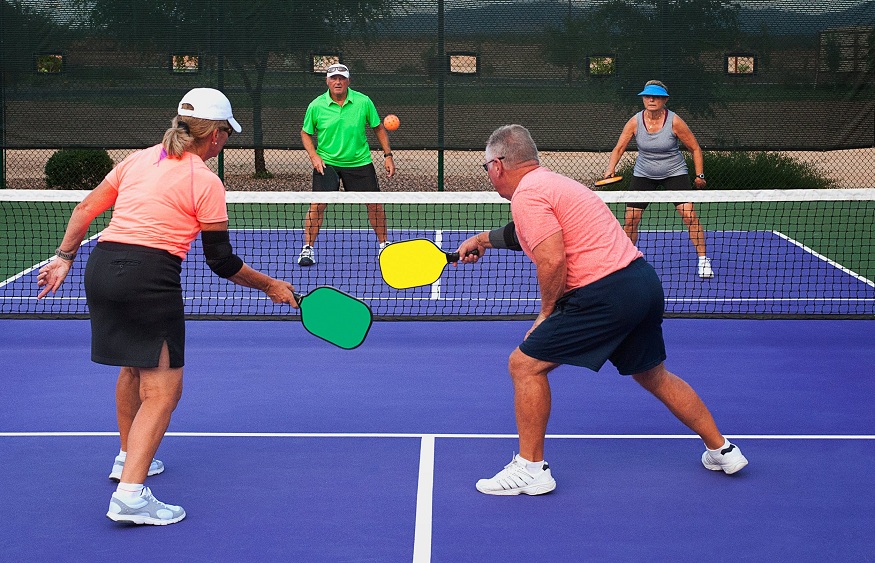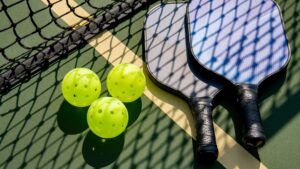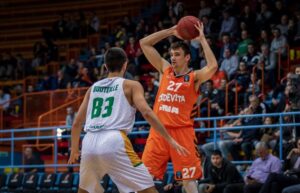Pickleball Nutrition: Dietary Recommendations for Optimizing Performance

A well-planned and balanced diet is necessary for players of Pickleball, a hybrid sport that blends aspects of badminton, tennis, and table tennis, to maximize their stamina and effectiveness on the court. Comprehending the importance of essential macronutrients, staying hydrated and planning meal times is essential to developing a successful nutrition plan customized to the unique requirements of Pickleball. Pickleball players can improve their performance to new levels by incorporating these dietary advices into their game, which will also improve their endurance and general physical health.
Introduction
Pickleball players must maintain their energy levels, endurance, and general performance on the court, which has led to the sport’s current surge in popularity. This may be achieved by paying close attention to good diet. Putting into practice a well-organized dietary plan that includes the proper ratio of macronutrients, enough water, and appropriate meal timings is essential to maximize Pickleball players’ physical capacity and gameplay.
Read more :How to Get Noticed on the Best Indian Short Video Apps
Understanding Pickleball Nutrition
Comprehending the distinct nutritional needs of Pickleball players is crucial in customizing dietary guidelines that correspond with the dynamic characteristics of the sport. To continuously perform at a high level, Pickleball players need to prioritize eating a diet that promotes long-term energy, muscle recovery, and general physical well-being. An effective Pickleball nutrition plan starts with the proper combination of macronutrients, hydration techniques, and meal scheduling.
Key Macronutrients for Pickleball Players
Pickleball players need to focus particularly on important macronutrients because they are essential for sustaining energy levels, encouraging muscle repair, and supporting other body processes. During games, the three main macronutrients—fats, proteins, and carbohydrates—have different effects on how well players perform and how long they can last.
Importance of Carbohydrates for Sustained Energy
For Pickleball players, carbohydrates are the main energy source since they give them the energy they need to play with intensity and endurance on the court. Including complex carbs in their diet—like whole grains, fruits, and vegetables—guarantees a continuous release of energy, avoiding energy spikes during gameplay.
Essential Proteins for Muscle Repair and Recovery
For Pickleball players, proteins are essential for muscle growth, repair, and general health. Lean protein foods like chicken, fish, tofu, and legumes aid in the development, maintenance, and repair of muscles, allowing athletes to recuperate quickly from demanding practices and games.
Incorporating Healthy Fats for Optimal Function
Although they are sometimes disregarded, Pickleball players need healthy fats to support a variety of body functions and to have sustained energy. Gamers’ performance and endurance during gameplay are enhanced when they include sources of healthy fats, such as avocados, nuts, seeds, and olive oil, in their diet. These fats also help gamers stay satiated, support heart health, and improve brain function.
Hydration Guidelines for Pickleball Players
Pickleball players must stay well hydrated to play at their best, avoid dehydration, and support their bodies generally. This is especially important during intense gameplay. In addition to aiding in body temperature regulation, adequate hydration promotes the movement of nutrients, proper muscular function, and joint lubrication—all of which are necessary for athletes to provide their best on the court.
Pre-Game Meal and Snack Recommendations
To make sure players have the energy and nutrition they need to play at their best during Pickleball matches, it is important to prepare ahead for pre-game meals and snacks. When taken at the appropriate time before to a game, a well-balanced combination of macronutrients can have a major impact on players’ energy levels, focus, and endurance, improving their overall performance.
Balancing Macronutrients for Pre-Game Meals
A balanced mix of carbs, proteins, and fats should be included in pre-game meals to give athlete’s long-lasting energy and support for their muscles as they play. Before a game, athletes can stay as focused and energized as possible by incorporating a variety of whole grains, lean proteins, and healthy fats into their meals.
Suitable Snack Options to Maintain Energy Levels
It is imperative for players to incorporate appropriate snack options during breaks or in between games in order to sustain their energy levels and avoid unexpected drops during intense gameplay. Fruits, nuts, energy bars, smoothies, and other healthy snack options give players the fast energy boosts and essential nutrients they need to stay focused and energized throughout their matches.
Post-Game Recovery Nutrition
It is imperative that players optimize their nutrition for post-game recovery in order to improve overall recovery following intensive Pickleball matches, facilitate muscle repair, and restore energy storage. The rehabilitation of players can be greatly impacted by the use of efficient post-game nutrition plans, which will enable them to recover quickly and get ready for upcoming practices and games.
Replenishing Electrolytes and Fluids
It is crucial to replenish lost fluids and electrolytes after a game to avoid dehydration and cramping, as these conditions can impede players’ general recuperation and health. Hydrating drinks, electrolyte-rich drinks, and mineral-infused water help gamers stay hydrated and help them regain electrolyte balance after strenuous gaming.
Consuming Protein-Rich Foods for Muscle Recovery
For Pickleball players, consuming foods and drinks high in protein after a game helps to support muscular health, recuperation, and repair. Players can speed up their muscle recovery and get ready for next games and training sessions by include lean protein sources like chicken, eggs, Greek yogurt, and protein drinks in their post-game meals.
Importance of Including Complex Carbohydrates
Incorporating complex carbs into post-game meals facilitates the replacement and repair of players’ glycogen levels and energy stores following physically demanding Pickleball matches. Including complex carbohydrate-rich fruits, sweet potatoes, and whole grains helps players replenish their energy stores and gets them ready for more training and gameplay.
Avoiding Common Nutritional Pitfalls in Pickleball
Pickleball players need to be mindful of frequent dietary mistakes that may impair their general health and performance on the court. A balanced, nutrient-rich diet, as well as avoiding overindulging in sugary snacks, processed meals, and harmful fats, are essential for ensuring athletes get the most out of their food intake and play to the fullest.
Tailoring Nutrition for Tournament Preparation
For Pickleball players who want to perform well over a long stretch of matches, they must customize their hydration and nutrition plans especially for tournament play. To guarantee that athletes compete at their peak and preserve their endurance, effective nutrition strategies that prioritize sustaining steady energy levels, encouraging muscle recovery, and avoiding dehydration must be put into place before the tournament.
Strategies for Nutrition and Hydration during Tournaments
It is essential for players to develop hydration and nutrition plans that work for them throughout competitions in order to sustain their attention, energy, and general on-court performance. Including nutrient-dense snacks, refreshing drinks, and well-balanced meals in your breaks can make a big difference in how long and how hard players can play throughout tournament matches.
Importance of Maintaining Consistent Energy Levels
Pickleball players must keep up a constant level of energy during competitions in order to play at their peak and endure through several sets. Players may maximize their energy reserves and attention by putting tactics into place that promote balanced diet, sufficient hydration, and timely meal planning. This will allow them to compete at their best for the duration of the event.
Conclusion
Creating a thoughtful diet plan that is adapted to the unique requirements of Pickleball is essential to promoting players’ general health, stamina, and performance on the court. Pickleball players can enhance their performance and reach new heights in their sport by optimizing their energy levels, muscle recovery, and playability through the importance of essential macronutrients, hydration techniques, and strategic meal planning.
FAQs
1. What are some effective meal options for players to consume before a Pickleball match?
Before a Pickleball match, players should think about eating a balanced meal that includes whole grains, lean proteins, and healthy fats. A quinoa salad topped with grilled tofu and mixed greens, a turkey, avocado, and vegetable stir-fry with brown rice or a whole-grain wrap with these ingredients are a few healthy choices.
2. How can players ensure they stay adequately hydrated during extended Pickleball tournaments?
Players should prioritize drinking plenty of water, including electrolyte-rich drinks, eat hydrating fruits like oranges and watermelon, and check the color of their urine to determine their level of hydration during long Pickleball tournaments. They should also refrain from consuming large amounts of sugary or caffeinated beverages, as these can exacerbate dehydration.
3. Are there any specific dietary recommendations for players recovering from Pickleball-related injuries?
Pickleball players who are mending from injuries should concentrate on consuming foods high in vital nutrients that aid in the body’s recovery process. Incorporating anti-inflammatory foods like berries and leafy greens, getting enough protein for muscle regeneration, and getting enough vitamins and minerals from a well-balanced diet are all part of this.
4. What are some common nutrition-related mistakes that players should avoid during intense Pickleball training sessions?
During rigorous Pickleball training sessions, it’s important to avoid common nutrition-related errors like overindulging in processed foods and sugary snacks, dehydration, and relying too much on heavy or high-fat meals that can impair energy and digestion. Prioritizing nutrient-dense diets that promote long-lasting energy and focus during training sessions is critical for athletes.
5. How can players maintain a well-balanced diet while managing their Pickleball training schedules and match commitments?
By planning and cooking meals ahead of time, including a range of nutrient-dense foods like fruits, vegetables, whole grains, lean meats, and healthy fats, and paying attention to portion sizes, players can maintain a well-balanced diet. To enhance their general health and performance, individuals can also make drinking plenty of water a priority, choose healthy snacks, and limit their intake of processed or high-sugar foods.






